
Scandinavia is a subregion of Northern Europe, with strong historical, cultural, and linguistic ties between its constituent peoples. Scandinavia most commonly refers to Denmark, Norway, and Sweden. It can sometimes also refer to the Scandinavian Peninsula. In English usage, Scandinavia is sometimes used as a synonym for Nordic countries. Iceland and the Faroe Islands are sometimes included in Scandinavia for their ethnolinguistic relations with Sweden, Norway and Denmark. While Finland differs from other Nordic countries in this respect, some authors call it Scandinavian due to its economic and cultural similarities.
Patria Plc is a Finnish provider of defence, security and aviation life-cycle support services. Patria is owned 50.1% by the Finnish government and 49.9% by Norwegian defense group Kongsberg Defense & Aerospace AS.

The Sikorsky SH-60/MH-60 Seahawk is a twin turboshaft engine, multi-mission United States Navy helicopter based on the United States Army UH-60 Black Hawk and a member of the Sikorsky S-70 family. The most significant modifications are the folding main rotor blades and a hinged tail to reduce its footprint aboard ships.

The Westland WS-61 Sea King is a British licence-built version of the American Sikorsky S-61 helicopter of the same name, built by Westland Helicopters. The aircraft differs considerably from the American version, with Rolls-Royce Gnome engines, British-made anti-submarine warfare systems and a fully computerised flight control system. The Sea King was primarily designed for performing anti-submarine warfare (ASW) missions. A Sea King variant known as the Commando was developed by Westland to serve as a troop transport.

The Royal Norwegian Air Force (RNoAF) is the air force of Norway. It was established as a separate arm of the Norwegian Armed Forces on 10 November 1944. The RNoAF's peacetime establishment is approximately 2,430 employees. 600 personnel also serve their draft period in the RNoAF. After mobilization, the RNoAF would consist of approximately 5,500 personnel.

The AgustaWestland AW101 is a medium-lift helicopter in military and civil use. First flown in 1987, it was developed by a joint venture between Westland Helicopters in the United Kingdom and Agusta in Italy in response to national requirements for a modern naval utility helicopter. Several operators, including the armed forces of Britain, Denmark, and Portugal, use the name Merlin for their AW101 aircraft. It is manufactured at factories in Yeovil, England, and Vergiate, Italy. Licensed assembly work has also taken place in Japan and the United States.
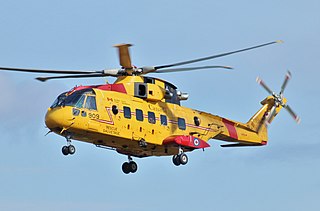
The AgustaWestland CH-149 Cormorant is the Canadian Forces designation for the AgustaWestland AW101, a helicopter used for air-sea rescue in Canada. Developed from AgustaWestland in Italy, the CH-149 is a medium-lift helicopter for military applications.

The NHIndustries NH90 is a European medium-sized, twin-engine, multirole military helicopter. It was the first production helicopter to feature entirely fly-by-wire flight controls. There is extensive use of composite materials and electronic sensors. The helicopter has two main versions, the TTH oriented towards land applications and the NFH, oriented towards naval use and focused on such tasks as ASW and marine SAR. Over 500 have been produced for a dozen users, and it remains in production.

NHIndustries (NHI) is a helicopter manufacturing company specifically established to be NATO Helicopter Management Agency's prime contractor for the design and development, industrialisation, production and logistic support of the NHIndustries NH90 series of helicopters.
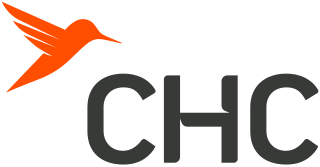
CHC Helicopter is a Texas-based helicopter services company.
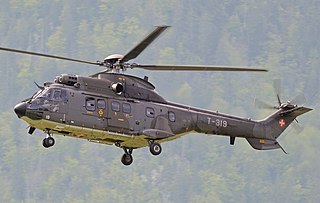
The Airbus Helicopters H215 is a four-bladed, twin-engined, medium-sized, utility helicopter developed and initially produced by French aerospace company Aérospatiale. It has been subsequently manufactured by the successor companies Eurocopter and Airbus Helicopters. The Super Puma is a re-engined and more voluminous version of the original Aérospatiale SA 330 Puma.

The Sikorsky S-92 is an American twin-engine medium-lift helicopter built by Sikorsky Aircraft for the civil and military helicopter markets. The S-92 was developed from the Sikorsky S-70 helicopter and has similar parts such as flight control and rotor systems.

The Lockheed Martin VH-71 Kestrel was a variant of the AgustaWestland AW101 that was being manufactured to replace the United States Marine Corps' Marine One U.S. Presidential transport fleet. Originally marketed for various competitions as the US101, it was developed and manufactured in the US by a consortium headed by Lockheed Martin, consisting of Lockheed Martin Systems Integration – Owego (LMSI), AgustaWestland and Bell Helicopter.

No. 330 Squadron RNoAF is a helicopter unit of the Royal Norwegian Air Force (RNoAF) and is Norway's military search and rescue service. The squadron operates ten Westland Sea King helicopters based at six airbases along the coast. Headquartered at Sola Air Station, the squadron has detachments at Rygge, Florø, Ørland, Bodø and Banak. The unit's primary duty is search and rescue (SAR), with secondary duties consisting of air ambulance and disaster relief.

The General Electric T700 and CT7 are a family of turboshaft and turboprop engines in the 1,500–3,000 shp (1,100–2,200 kW) class.
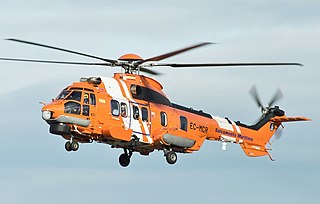
The Airbus Helicopters H225 is a long-range passenger transport helicopter developed by Eurocopter as the next generation of the civilian Super Puma family. It is a twin-engined aircraft and can carry up to 24 passengers along with two crew and a cabin attendant, dependent on customer configuration. The helicopter is marketed for offshore support and VIP passenger transport duties, as well as public service missions.
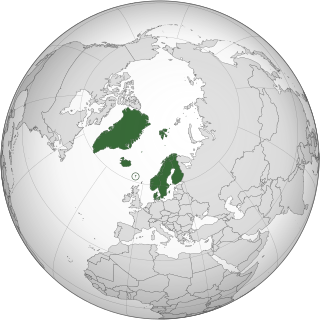
The Nordic countries are a geographical and cultural region in Northern Europe and the North Atlantic. It includes the sovereign states of Denmark, Finland, Iceland, Norway and Sweden; the autonomous territories of the Faroe Islands and Greenland; and the autonomous region of Åland.
The Italian Armed Forces aircraft designation system is a unified designation system introduced by the Italian Armed Forces in 2009 for all Italian military aircraft. The system is based on the United States Armed Forces 1962 United States Tri-Service aircraft designation system.
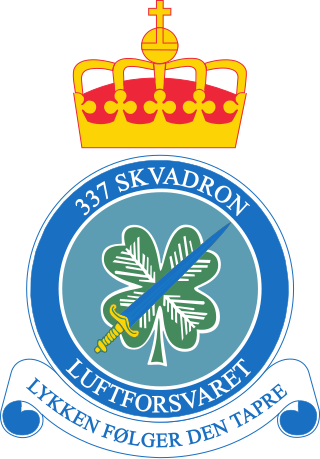
The 337 Squadron is a maritime helicopter unit of the Royal Norwegian Air Force (RNoAF). Based at Bardufoss Air Station, the squadron most recently operated eight NHIndustries NH90 until June 2022. The helicopters were used by the Norwegian Coast Guard and served on the Nordkapp-class, the Barentshav-class and on NoCGV Svalbard.

The NHIndustries MRH-90 Taipan was a version of the NH90 multirole helicopter in service with the Australian Army and the Royal Australian Navy in the early 21st century. It entered service in December 2007, and was withdrawn from service in 2022 by the Navy and in 2023 by the Army. Most of the aircraft were assembled in Australia. The fleet was originally scheduled for retirement in 2037. After the aircraft's withdrawal, they were offered for sale then disassembled for parts which is ongoing as of 2024.




















